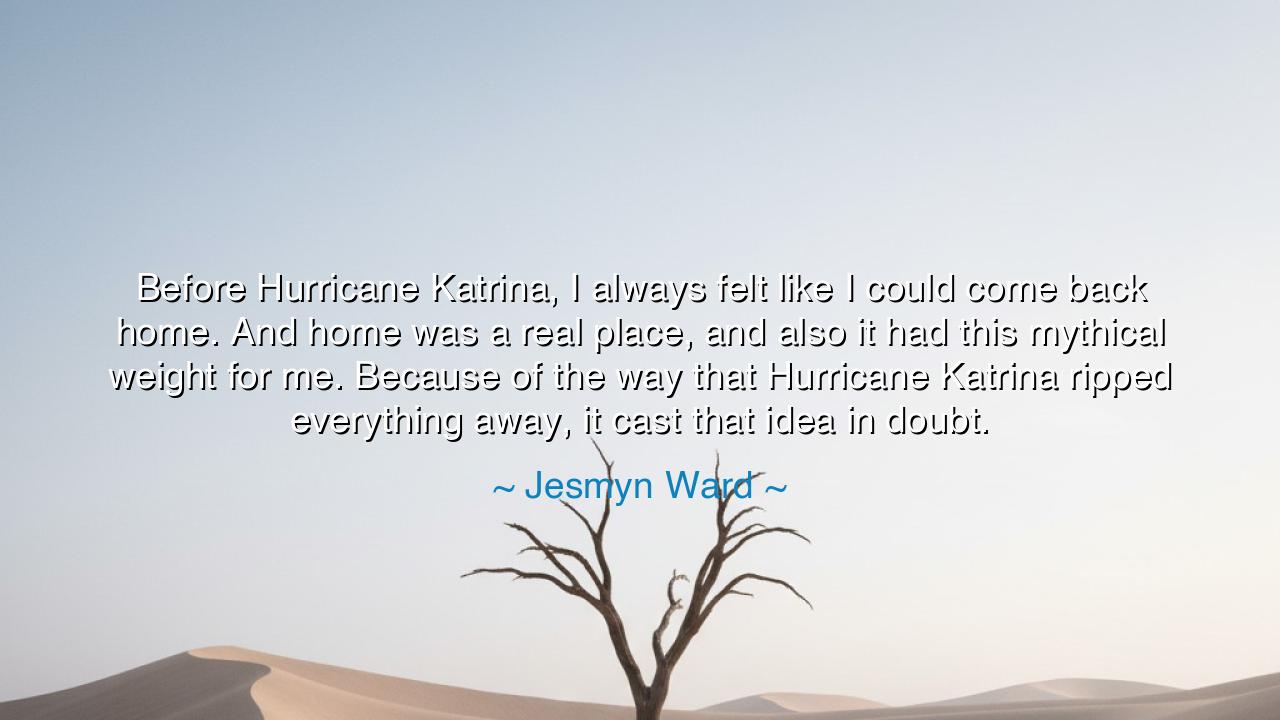
Before Hurricane Katrina, I always felt like I could come back
Before Hurricane Katrina, I always felt like I could come back home. And home was a real place, and also it had this mythical weight for me. Because of the way that Hurricane Katrina ripped everything away, it cast that idea in doubt.






The writer Jesmyn Ward once spoke with haunting truth: “Before Hurricane Katrina, I always felt like I could come back home. And home was a real place, and also it had this mythical weight for me. Because of the way that Hurricane Katrina ripped everything away, it cast that idea in doubt.”
In these words, we hear not only personal grief, but the cry of an entire people — those who have seen home, that sacred ground of belonging, washed away by the forces of nature and history. To Ward, home was not merely a structure of wood and stone, but a vessel of memory, identity, and ancestral spirit. Her loss was not only of shelter, but of certainty — that one could always return to where one’s story began. When Katrina came, it was not just a storm of wind and water; it was a storm that tore through the idea of permanence itself.
The origin of this quote lies in Ward’s own experience as a child of the Mississippi Gulf Coast, whose family and community were forever changed by Hurricane Katrina in 2005. When the storm descended upon Louisiana and Mississippi, it was one of the deadliest and most devastating disasters in American history. The winds howled, the levees broke, and the floodwaters swallowed entire neighborhoods — but the truest destruction lay in what could not be rebuilt: the sense of safety, continuity, and belonging. For Ward and millions of others, Katrina turned the concept of “home” into something fragile, uncertain, almost mythical. It was as though the very earth had withdrawn its promise.
In this, Ward joins the long line of those who have lived through exile and loss, and who have learned that home is both a place and a dream. The ancients too knew this pain. When Odysseus wandered for ten years across the seas, it was not just to return to a house, but to reclaim his sense of self. The destruction of his homeland would have meant the destruction of his purpose. Likewise, when the Hebrews were exiled from Jerusalem, their grief was not only for the city’s stones, but for the spiritual center that gave their lives coherence. “How shall we sing the Lord’s song in a strange land?” they cried by the rivers of Babylon. Jesmyn Ward’s words echo this same ancient lament — a cry not just for lost homes, but for the disorientation of the soul when the anchor of belonging is cut away.
But Ward’s insight goes further. When she speaks of home as having “mythical weight,” she reveals a deeper truth: that our sense of home is not built only from walls, but from meaning. For every person, “home” is both real and imagined — it is where our body rests, but also where our heart believes it belongs. Before the storm, she could trust in that myth — that home, like a mother, would always welcome her back. After Katrina, that faith was shattered. The winds did not merely destroy buildings; they unmade memory, scattering the symbols of identity across the waters. And in that loss, Ward faced the terrifying question: what does it mean to belong when the land that shaped you no longer stands?
Her struggle mirrors that of countless people throughout time who have watched their homelands vanish. Consider the people of Pompeii, who in one fateful day saw their world consumed by volcanic ash; or the Cherokee Nation, forced from their ancestral lands along the Trail of Tears, where “home” became a memory carried in song rather than stone. In each of these tragedies, the human spirit wrestled with the same revelation Ward expresses — that home is not guaranteed. The earth itself can betray us. Yet, even amidst ruin, there remains the power to rebuild meaning, to find home again not in place, but in one another.
Ward’s reflection is not merely mourning; it is also awakening. Through her pain, she discovered that while home may be destroyed in form, its essence can endure — if it is carried within. The storm that swept away her house also revealed her strength, her voice, and her calling as a writer. Out of destruction, she created art that gave voice to the voiceless, bearing witness to the beauty and resilience of the Gulf Coast’s people. In her hands, the ashes of home became the ink of remembrance. Her work reminds us that memory is the true architecture of belonging, and that through love, storytelling, and solidarity, what is lost can live again.
So, my child of storm and spirit, take this lesson from Jesmyn Ward: cherish your home, but do not bind your soul to its walls. For the world is impermanent, and even the strongest roots can be torn from the earth. Build your home also within — in your courage, your compassion, and your memory. When disaster comes, let those inner walls hold firm. Love your land, yes, but love even more the people, the stories, and the light that no flood can drown.
For as Ward’s words teach, the myth of home may falter, but its truth endures: that home is not a place untouched by ruin, but a spirit that endures through it. To live wisely is to hold both grief and gratitude — to know that everything can be taken, yet still choose to rebuild. And so, when life’s tempests come, remember: the true home is not what you return to, but what you carry forward — the flame within that no storm can extinguish.






AAdministratorAdministrator
Welcome, honored guests. Please leave a comment, we will respond soon